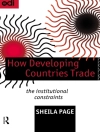
Accessible and comprehensive, this book puts forth an innovative perspective on international aid, going beyond top-down attempts to centre local voices and practices.
By providing an overview of newer iterations and overlooked practices in development, including citizen aid, technologies for development, and faith-based humanitarianism, the book explores the extent to which they disrupt existing models and potentially lead to more equitable grassroots-led approaches. The authors develop the concept of ‘horizontal development’ to examine how power and privilege operate in international and local horizontal development spaces. Examining challenges, they also highlight opportunities for doing things differently in light of prominent calls for decolonising aid and development.
Table des matières
Introduction
1. South-South Cooperation and Development
2. Professional Volunteering and Voluntourism
3. Localisation and ‘Local’ Aid
4. Faith-Based Approaches
5. Diaspora-led Development
6. Transnational Citizen Aid
7. Digital Humanitarianism
8. Mutual Aid and Solidarity
Conclusion
A propos de l’auteur
Thabani Mutambasere is Lecturer in African Studies and International Development in the School of Social and Political Science, University of Edinburgh. His research explores how African diasporas impact their home countries through political engagement, development work, and humanitarian efforts, beyond just financial remittances. Before joining academia, Thabani worked in the development sector tackling issues related to governance and civic education.











